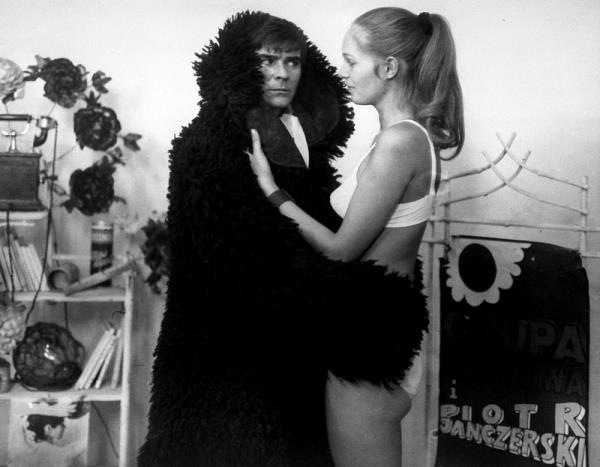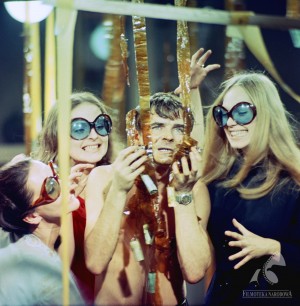What happens when a person who embodies all your dreams and hopes (meaning not only erotic ideal, but your life aspirations) appears in your life and seduces you with words you’ve always wanted to hear? The protagonist of Hunting Flies (1969) lacks something, but when it seems his savior (a young lady) comes to help, a new life he’s starting with her is, as a matter of fact, not a bed of roses. Let’s watch now one of the movies directed by recently passed Andrzej Wajda.

Włodek (Zygmunt Malanowicz), around 30-year-old married man, a father and bookshop worker spends his days laboring hard to provide for his family, which is not only his wife and son, but also parents in law. The interior of the flat is tiny and full of flypaper, the atmosphere tense and confined – the father (Józef Pieracki) is paying more attention to flies and TV documentaries than to family members, the mother (Hanna Skarżanka) investigates on lost glasses as if it’s a matter of life or death and it seems like Włodek’s wife, Hanka (Ewa Skarżanka), is constantly disappointed with him. The protagonist is not completely there, his mind flows somewhere, longs for something better – and it comes to him. At a cultural party for intellectuals he meets Irena – beautiful, bold and blonde Polish philology student. Her erudite and imaginative talk finally enhances his self-esteem and makes his dreams bigger, which means finishing studies and translating Russian poetry for magazines. Well, that vision is too beautiful to be real.
They talk, they talk, then they talk and then do a little more of talking (bravo for screenwriter, Janusz Głowacki) – especially Irena, who has all this knowledge in Popper, Jacobson and Ingarden theories which she tries to put into the “real life”; she constantly analyses (people and situations) but draws false conclusions. She’s an extraordinary character, a snobbish egghead (if you remember Philosopher from A Trip Down the River (1970) – that’s this type). What’s interesting, her affair with Włodek is surprisingly not strictly erotic – the sex thing is rather a sideshow compared to other activities main characters have. Irena is simply stubborn on making her lover successful and fulfilled (against his will at some point), so that she is using her beauty and charm to manipulate people in power to give her what she wants for Włodek. Actually, not only Irena is engaged in these practices. Hunting Flies shows more that kind of people, so called parvenues, who seek situations in which they could meet someone important, someone to make deals with or to be commended by. That shows the common truth that to be someone you have to know right people. It’s humorous but with bitter taste.
Another crucial aspect of Wajda’s movie is portrait of a man and condition of masculinity. Włodek embodies masculinity crisis – he’s overwhelmed by his family, lost his aspirations, feels like he’s trapped in womens’ web by his mother in law, Ewa, Irena and even his boss who’s a woman too. It looks like women are in power and play with men more successfully. There is a scene at the party in Nieporęt where a TV director (Jacek Fedorowicz) tries to seduce young ladies by telling them they’d be perfect actresses – he fails at each attempt. Not without meaning is the song sang at the very same party by band called Close to Tears – there are only male musicians who act strengthless and beg mummy for help.

It’s worth to pay attention to small episodic scene with kids – a boy and a girl – who discuss change in their family situations cause of their parents affairs coming to light. The language they use, scholar and intelligent, is parallel to Irena’s and to me personally this creates association with Wes Anderson movies in which kids talk and act like adults, whereas their parents behave quite childishly (especially in The Moonrise Kingdom). In Wajda’s movie it seems that young characters are just to stress universalism of the main characters situation.
With Hunting Flies Andrzej Wajda clearly deviated from his usual style and gave us a satiric bitter-sweet picture of young adults being trapped in various social deals, family issues, class system (still visible) – just like eponymous flies stuck to a flypaper.